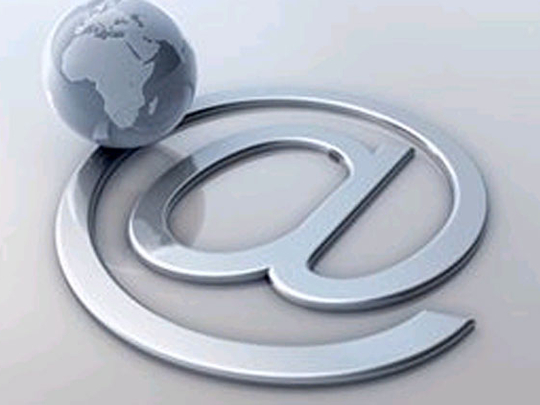
There's good reason Arabic advertisements are appearing more and more on websites across the globe.
Online, the Arab language is flourishing as the English-language dominated internet slowly gives way to a new multilingual era, promising billions of new e-commerce dollars and a growing sense of electronic cultural self-identity in the Middle East.
"With more users in the MENA region connecting to the internet, businesses of all types and sizes are starting to realise the opportunity to express their brand values through the online marketing space," said Joanne Kubba, Global Communications and Public Affairs Manager at Google, Middle East and North Africa.
"This is being driven by the growth in users coming online in recent years. Whilst Google does not reveal country specific data, we have seen an increased demand for Google AdWords," Kubba said.
According to World Internet Statistics, latest recorded figures show that from 2000 to 2009, Arabic language on the web grew 2,297 per cent, easily ahead of Russia's 1,359 per cent.
Of the world's total 1.8 billion web users, 60.2 million (3.3 per cent) are Arabic speaking.
The mushrooming of Arabic on the internet can be attributed in part to ambitious policies such as those advocated by the United Arab Emirates, which leads the Middle East region with 74.1 per cent internet penetration.
As many as 3.5 million of the 4.8 million residents in the UAE are online.
Since 2000, the UAE has witnessed a 384 per cent increase in internet user growth, during a financial and social renaissance that has propelled the Emirates onto the world stage.
Climbing numbers
A study made public in March by the United Nations Economic and Social Commission for Western Asia (ESCWA), said that as Arab user numbers continue to climb in the Middle East, so efforts by countries, such as the UAE, to match the electronic language explosion with better web access and content in Arabic expand.
"Some ESCWA member countries have started to develop projects and plans for content development, including Egypt, Jordan, Lebanon and United Arab Emirates. A milestone of the success of digital content in the region, is the Library of Alexandria in Egypt which contains six specialised digital libraries for almost 10 billion pages of text and content," the report stated.
Strong active government programmes, such as is implemented in the UAE, to promote internet presence and content are critical, said the UN report, but there is "a need for pan-Arab cooperation".
The study suggested that "the Arab region needs to give more attention to pressing internet governance issues given that the internet is on the verge of a new economic world order.
One of the key actions to bolstering the estimated billions in new economic spin-offs in the region, from an expanding Arabic presence on the internet, is to "identify national and regional priorities with regard to digital content, thereby reaping the economic benefits. This can lead to a positive effect that can improve competitiveness at the local and national level, generate employment and business opportunities and increase the use of information resources in product development."
The UN report said that governments should be "encouraging investments in digital content and providing incentives to stimulate economic opportunities that can attract capital".
Report authors said: "Developing multilingual local content to preserve the cultural diversity of the region is also important in order to guarantee full inclusion of Arab populations in the new world order."
Khalid Fattal, Chairman and CEO of the Multilingual Internet Names Consortium (MINC), said his firm offers translation services of English sites to Arabic language in real-time on the web.
A wealth of just such new initiatives, to bolster Arab access to the web, is transforming how Arabic language only surfers view the world, commerce and social networking sites.
"This is of paramount importance to more than 350 million Arabs whose native language is Arabic, and 1.5 billion Muslims who learn the Arabic language for reading the Quran, the vast majority of whom do not know English, and who have been isolated from the English internet phenomenon due to the language barrier of the internet, and delays in deploying multilingual domains names, IDNs," Fattal said from the United Kingdom.
"They are thirsty for information which does not exist in the Arabic language now. And they cannot reach and read English sites so that they can become better informed, active citizens and consumers of information to enlighten and empower themselves."
Fattal is also a member of the Internet Corporation for Assigned Names and Numbers (ICAAN), the US-based body governing domains such as .com, .org and .info and the UAE's .ae.
A member of ICANN's President's Advisory Committee on International Domain Names (IDNs), Fattal welcomed ICANN's April 22 final approval of four new non-English top-level domain names.
New domain
The newly approved Arab domain name in the UAE is .emarat and will serve as an alternative to the English variant .ae.
"We will soon be announcing new services and applications that will change the way internet and e-commerce is in the Arab world," Fattal told Gulf News.
"The start is important but in itself it will only scratch the surface. Compare it to the first baby steps a baby takes after birth, he can then become an Olympic runner or a couch potato, it depends on what happens in the middle," he said.
Fattal said Arab countries must come together to establish a "long-term five or 10-year plan."
Baher Esmat, ICANN's Middle East Regional Manager, said from Cairo that the "Arab community [including governments, business, civil society, individuals] still has a long way to go with regard to content ... but given the growth in internet use in the Arab world, the volume of content will naturally increase, especially with the development taking place in social media and blogging."
Esmat said the Middle East is "hungry for more localised applications, and they could access those applications through IDN-based addresses, Arabic in our case, we would see tens of millions of new Arab users online in the next few years."
The key is enabling users "to access Arabic content using Arabic-based addresses," he said.
Adrian Kinderis, Chief Executive Officer of AusRegistry International Pty Limited, helped the UAE launch its .ae domain name in the beginning in 2006 and has confirmed that his firm's software will be used once again for the Registry System for the .emarat domain name.
The new Arabic domain name system is expected to go online soon.
Kinderis predicted that the new .emarat name will be good for business and will bolster the growth of the Arab language on the web.
Access
Noting that it will open up "options for businesses that target Arabic speaking customers", he said that ".emarat will make the internet more accessible to more people within the UAE and throughout the Arabic-speaking world. That will inevitably lead to an increase in internet penetration throughout the region ..."
"This is likely to be many millions of dollars at least over the medium term but in the longer term is undeniably an asset for the people of the UAE that has immeasurable value."
The social impact will also be long lasting, he said from his firm's headquarters in Melbourne, Australia.
"Increasing accessibility to local language content will inevitably inspire innovation within existing web companies and will provide opportunities for new start-ups, both within the region and from further afield. Global web companies ... will be able to achieve a broader reach into markets that were previously largely inaccessible to them," Kinderis said.
Jothan Frakes, Chief Operating Officer of Minds and Machines, a Seattle-based consultancy firm that specialises in top-level domain names, welcomed any tool that expands the cultural complexion of the internet.
"I do think that the addition of Arabic domains along with an increase in Arabic content and users and the significant growth in Arabic population are direct indications of the internet becoming a world wide web," he said.
"From my personal position, I believe that the immense expansion of the internet growth among Arabic users is something that will be a large benefit to the global community," Frakes said. "The internet is truly an international network and the promise of such a large populace with rich culture is valuable from a social perspective."
As for Arab-speaking only web users, logging on to websites that use Arab domain names may feel a "stronger sense of both initial trust and connection with the destination website," he said.
Global search engine leviathan, Google, says it is doing everything within its power to embrace the multilingual trend online to help users meet the potential that the internet holds.
Google's Kubba said it's difficult to determine how much Arabic content is actually online.
But judging by the fact that there are now "26 million personal computers in the Middle East, up from 11 million in 2004," Kubba said that "with so many Arab users now connected, it is only natural that the content creation industry will experience a boost to cater to their demands."
In Dubai, Google recently held its Google Day, Arabia 2.0, a regional forum designed with a view to "increase Arabic content," Kubba said, by bringing together top business and government leaders from MENA.
"We believe there is a wave of excitement around the developments taking place on the internet and search in the Middle East. Our role is to act as a catalyst to accelerate increased Arabic content, provide localised products, translation tools and partnerships which will ultimately assist individuals with their online activities," Kubba told Gulf News. "
Kubba believes that as Arabic content on the web grows, so will business in the region and beyond.
Google has launched a step-by-step online advertising guide to using Google AdWords for companies in the region that want to advertise on the web.
With the addition of businesses going online every day in the region, there should be enough critical mass to move the region forward on the web, she said.
"We have a large number of GCC clients and our portfolio is constantly increasing. With more SMB's [small-medium businesses] coming online and businesses in the region realising the growing role the internet is set to play in helping them connect with their consumers, we believe there is huge potential for the development of our business," she said.
"Online marketing is increasingly becoming an integral part of the global marketing industry, providing local companies with the opportunity to expand their client base. The MENA region is rapidly playing catch up to more mature markets which will see a substantial growth in online Ad spend in the near future," Kubba said.













